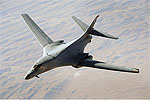4 airmen disciplined after June friendly fire incident in Afghanistan
 Four airmen were disciplined through administrative means for their role in a friendly fire incident last June in Afghanistan.
Four airmen were disciplined through administrative means for their role in a friendly fire incident last June in Afghanistan.
Five American soldiers and one Afghan soldier were killed June 9 in Zabul province when a B-1B Lancer dropped a bomb on them, mistakenly believing they were insurgents. An investigative report by U.S. Central Command investigating officer Air Force Maj. Gen. Jeffrey Harrigian, released in September, concluded that key leaders of a team of Green Berets mixed up friendly and enemy locations and incorrectly believed the targeting system of the bomber could identify markers carried by friendly troops.
The aircrew also incorrectly thought the bomber's Sniper pod could detect the infrared strobes carried by the soldiers who were killed, the report found. The night vision goggles used by the bomber's pilots could only detect the strobes at up to 7,000 meters, but the strobes were too far away to be seen.
Air Combat Command spokesman Capt. A.J. Schrag said in an email Tuesday that four air crew members received administrative actions, but would not specify what kind of actions, citing the Privacy Act.
"After carefully reviewing the facts and evaluating the circumstances as reported in the USCENTCOM investigation as they relate to the B-1B aircrew, the 12th Air Force commander, as the appropriate command authority, took administrative action to remedy mistakes made during the operation," Schrag said. "However, it was determined that aircrew procedural miscues did not directly cause the loss of life in this matter."
Schrag said 12th Air Force commander Lt. Gen. Tod Wolters issued administrative actions to the crew the week of Nov. 17. They were allowed to provide rebuttals. After reviewing the rebuttals, Wolters upheld the actions effective Dec. 10.
The Army said in December that the Green Beret team leader and team sergeant of the Special Forces Operational Detachment Alpha involved in the airstrike will not be punished.
Schrag also said that the military is taking steps to highlight technical and training issues related to the bombing for all forces in the field. Those lessons are also being incorporated into training programs for combat air forces, he said.
Schrag said this is the first friendly fire incident involving the B-1 since combat began in Afghanistan and Iraq in 2001. He said there have been 45 friendly fire incidents involving American fixed-wing and rotary-wing aircraft in those wars.
"While incidents like this are a rarity, the death or injury of any coalition member is a tragedy we continually strive to avoid," Schrag said. "The Air Force is committed to learning from this incident to ensure we continue to effectively provide the airpower that is critical to our troops on the ground and paves the way for their success."